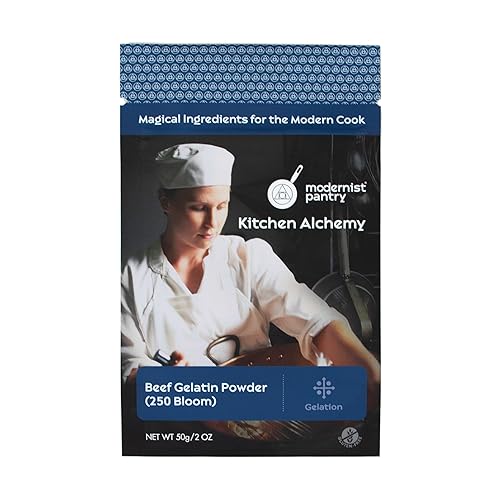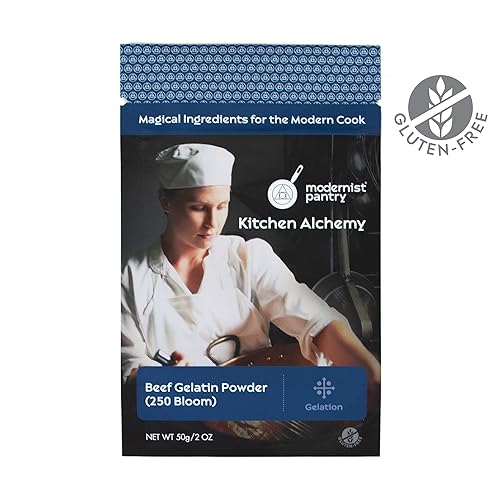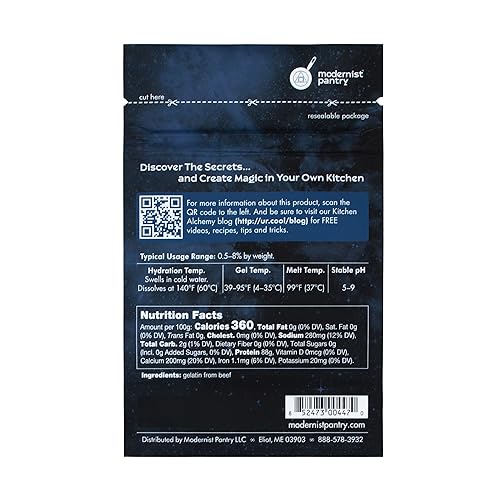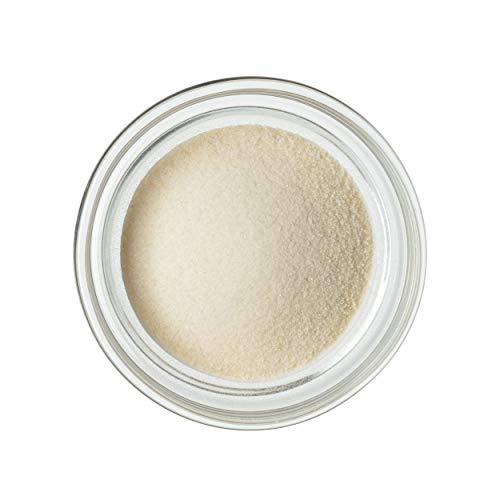





Pure Beef Gelatin Powder (250 Bloom) ⊘ Non-GMO Gluten-Free - 50g/2oz
Gelatin is a versatile, odorless, and tasteless thickening agent that transforms into a gel when combined with liquid and heated. It is a thermo-reversible substance, meaning that the gel liquefies when heated above its melting point but regains a jelly-like consistency when cooled again. The melting point of gelatin is close to the body temperature of the animal from which it is made, typically around 99°F/37°C for mammals.
The raw material for gelatin is collagen, a naturally occurring pure protein commercially produced from the bones, cartilage, tendons, skin, and connective tissue of various animals. Gelatin can also be extracted naturally at home, such as when boiling bones to make a stock or aspic.
Gelatin is commonly found in a wide range of foods, including molded desserts, cold soups, trifles, aspic, marshmallows, and confectioneries like Peeps, gummy bears, candy corn, and jelly beans. It can also be used as a stabilizer, thickener, or texturizer in products like jams, yogurt, cream cheese, and margarine. Gelatin is often added to reduced-fat foods to simulate the mouthfeel of fat and create volume without adding calories. Additionally, it is used for the clarification of juices and vinegar.
However, due to its derivation from animal sources, gelatin poses challenges regarding kosher and halal status, as well as vegetarian preferences. In these cases, alternative options include agar agar, guar gum, xanthan gum, pectin, and kudzu.
The term "bloom" in the context of gelatin can refer to two different aspects. Firstly, it describes the process of softening the gelatin in liquid prior to melting it, often by soaking it in cold water for 5-10 minutes. It's important to note that fresh tropical fruit juices, such as papaya, kiwi, mango, and pineapple, should be avoided as they contain an enzyme (bromelin) that can break down the gelatin. Pasteurized or frozen versions of these juices are safe to use.
Secondly, the "bloom" refers to the firmness of the gelatin, which is measured using a Bloom Gelometer, named after its inventor, Oscar T. Bloom. The Bloom Strength is a numerical value that indicates the rigidity of the gelatin film, with a higher number representing a stiffer product. Gelatin used in food typically ranges from 125 to 250 Bloom, with the most popular grades being Silver (160 Bloom) and Gold (190-220 Bloom). Generally, the higher the Bloom, the more expensive the gelatin.
One important consideration is that freezing gelatin can cause syneresis upon thawing, which is the disintegration of the gel accompanied by the weeping of liquid.
Modernist Pantry offers high-quality gelatin powder made in the US from beef, classified as a Type B gelatin with a Bloom strength of 240-250. This product is gluten-free, keto-friendly, and allergen-free, making it suitable for a wide range of culinary applications, including recipes that call for gelatin and for clarification purposes.
product information:
| Attribute | Value | ||||
|---|---|---|---|---|---|
| is_discontinued_by_manufacturer | No | ||||
| package_dimensions | 9.09 x 6.26 x 0.43 inches; 1.76 ounces | ||||
| upc | 852473004470 | ||||
| manufacturer | Modernist Pantry LLC | ||||
| best_sellers_rank | #92,872 in Grocery & Gourmet Food (See Top 100 in Grocery & Gourmet Food) #230 in Gelatins | ||||
| customer_reviews |
|
MORE FROM great lakes gelatin






